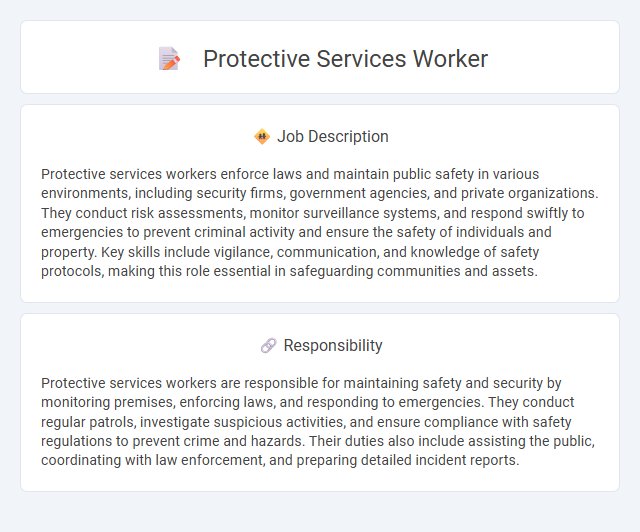
Protective services workers enforce laws and maintain public safety in various environments, including security firms, government agencies, and private organizations. They conduct risk assessments, monitor surveillance systems, and respond swiftly to emergencies to prevent criminal activity and ensure the safety of individuals and property. Key skills include vigilance, communication, and knowledge of safety protocols, making this role essential in safeguarding communities and assets.
Protective services worker roles likely fit individuals who can handle high-stress environments and possess strong problem-solving skills. People with a calm demeanor and physical fitness may have higher chances of succeeding in maintaining safety and responding effectively during emergencies. Those prone to anxiety or discomfort in confrontational situations might find this job less suitable.
Qualification
Protective services workers typically require a high school diploma or equivalent, with many positions favoring candidates who have completed specialized training or certification programs in security, law enforcement, or emergency response. Qualifications often include physical fitness, strong observational skills, and the ability to respond quickly to emergencies, supported by certifications such as CPR, first aid, and use of force training. Experience in related fields, background checks, and ongoing professional development are essential to maintaining effective security and safety standards.
Responsibility
Protective services workers are responsible for maintaining safety and security by monitoring premises, enforcing laws, and responding to emergencies. They conduct regular patrols, investigate suspicious activities, and ensure compliance with safety regulations to prevent crime and hazards. Their duties also include assisting the public, coordinating with law enforcement, and preparing detailed incident reports.
Benefit
Protective services workers likely experience significant job benefits such as stability and consistent demand across various sectors, enhancing long-term employment prospects. The role probably offers opportunities for skill development in security protocols, emergency response, and risk assessment, which may increase career advancement potential. Access to benefits like health insurance, retirement plans, and paid training could further contribute to overall job satisfaction and security.
Challenge
Protective services workers likely face high-pressure situations requiring quick decision-making and strong problem-solving skills. They probably encounter unpredictable and potentially dangerous environments that demand vigilance and resilience. The challenge of balancing safety protocols with compassionate interaction may be significant in this profession.
Career Advancement
Protective services workers have clear pathways for career advancement through specialized training and certifications in areas such as emergency response, law enforcement, or cybersecurity. Gaining experience and additional qualifications can lead to supervisory or managerial roles within security teams or government agencies. Continuous professional development enhances opportunities for higher salaries and leadership positions in protective services careers.
 kuljobs.com
kuljobs.com